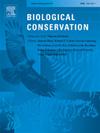Characterizing the illegal trade of carnivores on a social media platform in Iran
IF 4.4
1区 环境科学与生态学
Q1 BIODIVERSITY CONSERVATION
引用次数: 0
Abstract
Illegal wildlife trade threatens biodiversity globally and has become more accessible through social media, where traffickers reach buyers in minimally regulated spaces. Despite Iran's strategic location on major trade routes, little is known about its wildlife markets, particularly on online platforms and in Persian-language contexts. This study examines the illegal trade of native and non-native carnivores on Instagram in Iran using data from 293 public advertisements posted throughout 2022. Non-native species, such as lions, were more prevalent in the live animal trade, while native species, like red foxes, were more often advertised for their body parts. Trade in native species exhibited a significant seasonal peak in spring and summer, aligning with birthing seasons. In contrast, trade in non-native species showed no significant seasonal trend, suggesting sourcing through international or captive networks. To understand marketing strategies, we conducted a reflexive thematic analysis of Persian-language captions and photos. Four key themes emerged: commodification of wildlife, normalization of captivity, status signalling, and controlled access. Sellers emphasized tameness, luxury appeal, and exclusivity to attract consumers, while rarely mentioning biological traits. The advertisements portrayed wild animals as desirable consumer products, obscuring their conservation status and the ethical implications of using them. Our findings underscore the urgent need for enhanced monitoring in non-English contexts, targeted enforcement during peak seasons, and platform-level interventions to disrupt the online wildlife trade in underregulated regions, such as Iran.
在伊朗的一个社交媒体平台上描述食肉动物的非法贸易
非法野生动物贸易威胁着全球生物多样性,并通过社交媒体变得更容易获得,贩运者在社交媒体上以最低限度的监管空间接触买家。尽管伊朗在主要贸易路线上的战略位置,但人们对其野生动物市场知之甚少,特别是在在线平台和波斯语背景下。这项研究使用了整个2022年发布的293个公共广告的数据,调查了伊朗Instagram上本地和非本地食肉动物的非法贸易。非本地物种,如狮子,在活体动物交易中更为普遍,而本地物种,如红狐,则更常因其身体部位而做广告。本地物种贸易在春季和夏季呈现明显的季节高峰,与繁殖季节一致。相比之下,非本土物种的贸易没有明显的季节性趋势,表明通过国际或圈养网络采购。为了理解营销策略,我们对波斯语的文字说明和照片进行了反身性的主题分析。出现了四个关键主题:野生动物商品化、圈养正常化、状态信号和控制进入。卖家强调“温顺”、“奢华”和“独一无二”来吸引消费者,而很少提及生物特征。这些广告将野生动物描绘成令人向往的消费品,模糊了它们的保护状况和使用它们的伦理含义。我们的研究结果强调,迫切需要加强在非英语环境下的监测,在旺季有针对性的执法,以及在监管不足的地区(如伊朗)进行平台级干预,以破坏在线野生动物贸易。
本文章由计算机程序翻译,如有差异,请以英文原文为准。
求助全文
约1分钟内获得全文
求助全文
来源期刊

Biological Conservation
环境科学-环境科学
CiteScore
10.20
自引率
3.40%
发文量
295
审稿时长
61 days
期刊介绍:
Biological Conservation is an international leading journal in the discipline of conservation biology. The journal publishes articles spanning a diverse range of fields that contribute to the biological, sociological, and economic dimensions of conservation and natural resource management. The primary aim of Biological Conservation is the publication of high-quality papers that advance the science and practice of conservation, or which demonstrate the application of conservation principles for natural resource management and policy. Therefore it will be of interest to a broad international readership.
 求助内容:
求助内容: 应助结果提醒方式:
应助结果提醒方式:


